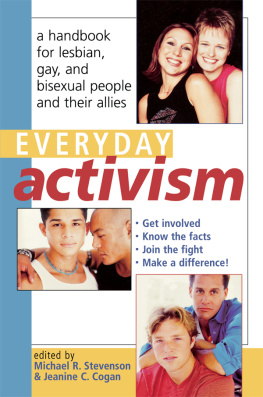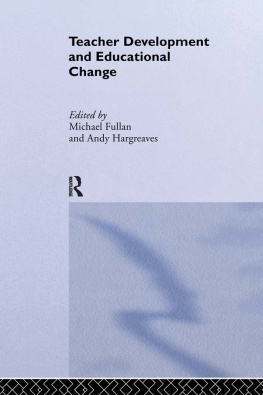Everyday
activism
Published in 2003 by
Routledge
29 West 35th Street
New York, New York 10001
www.routledge-ny.corn
Published in Great Britain by
Routledge
11 New Fetter Lane
London EC4P 4EE
www.routledge.co.uk
Copyright 2003 by Routledge
Routledge is an imprint of the Taylor &. Francis Group.
All rights reserved. No part of this book may be reprinted or reproduced or utilized in any form or by any electronic, mechanical, or other means, now known or hereafter invented, including photocopying and recording, or in any information storage or retrieval system, without permission in writing from the publishers.
10 9 8 7 6 5 4 3 2 1
Library of Congress Cataloging-in-Publication Data
Everyday activism : a handbook for lesbian, gay, and bisexual people and their allies / edited by
Michael R. Stevenson and Jeanine C. Cogan.
p. cm.
Includes bibliographical references and index.
ISBN 0-415-94481-3 (hardback)ISBN 0-415-92668-8 (pbk.)
1. Gay rights. 2. GaysPolitical activity. I. Stevenson, Michael R. II. Cogan, Jeanine C.
HQ76.5 .E95 2003
305.90664dc21
2002153069
Contents
Michael R. Stevenson and Jeanine C. Cogan
Jeanine C. Cogan
Michael R. Stevenson
Jessica F. Morris and Stacey Hart
Jeanine C. Cogan
David C. Sobelsohn
Christopher J. Portelli
Clinton W. Anderson and C. Dixon Osburn
Robin A. Buhrke
Beverly R. King
Michael R. Stevenson
Karen M. Anderson and Michael R. Stevenson
Jennifer M. Hoag and Lisa M. Schmidt
Guide
First and foremost we wish to express our appreciation to our contributors. Without their commitment and their patient and persistent support, this volume would have been impossible to produce. This is indeed an unusual group of scholars/practitioners/advocates, who have intentionally and elegantly bridged the divide between those who gather and interpret data and those who use it as a basis for advocacy. We are grateful for their diligence, their expertise, and their commitment to everyday activism both literally and figuratively.
We wish to thank Nicole Bixler, Jennifer M. Hoag, Charity Schafer, and Lisa Schmidt for their tireless efforts on behalf of this book. In addition to hours of library research, they provided invaluable assistance with proofreading and fact checking in their role as assistant to the senior editor. We also wish to thank Ilene Kalish, Kimberly Guinta, and our team at Routledge for their belief in this project and their assistance in bringing our vision into reality.
We wish to acknowledge Charles W. Smith, The Gay Financial Network, and SIECUS (The Sexuality Information and Education Council of the United States) for granting permission to print excerpts from their publications in , Ending Discrimination in the U.S. Military, and the series of reports that provided much of the basis for its conclusions.
Michael R. Stevenson and Jeanine C. Cogan
In the Introduction, you will
- Learn how to use this book to advocate for equality.
- Learn the importance of public policy.
- Learn how persistence and hard work led to a national lesbian health agenda.
- Learn about international advocacy needs and efforts.
- Get a sneak preview of the remaining chapters.
There is no doubt that the policy climate for lesbian, gay, and bisexual people (collectively referred to here as LGBs) In the late 1980s, the U.S. Congress supported protections against antigay hate crimes. Under the leadership of Senator Arlen Specter, a devout Republican from Pennsylvania, Congress passed the Hate Crimes Statistics Act of 1990 and Republican president George H. W. Bush signed it into law. As a result, state and local law enforcement agencies are encouraged to collect data on anti-LGB hate crimes.
In the 1990s during the Clinton administration, an unprecedented number of openly lesbian and gay people were appointed to government positions. Some of these positions were high ranking and visible.
At a time when LGB communities have achieved such positive policies, there has been an equally powerful effort to deny the civil rights of LGBs. In 1998, as plans for this book were formulated, the majority leader of the U.S. Senate publicly characterized homosexuality as a sin comparable to alcoholism, kleptomania, and sex addiction. Senate Republicans blocked James C. Hormels nomination as ambassador to Luxembourg simply because he is openly gay. The House of Representatives approved a measure to deny federal housing funds to San Francisco because of its support of domestic partnership laws for gay and lesbian couples. The U.S. House considered a bill that would have denied funds to implement President Clintons executive order barring federal agencies from discriminating against gays and lesbians (an order that 70 percent of U.S. Americans favored). At the final hour, the House dropped a provision that would have barred unmarried couples in Washington, D.C., from adopting children. Conservative groups ran full-page ads in major newspapers featuring ex-gays and offering to cure gay men and lesbians.
As has been the case throughout history, when marginalized groups gain more rights there is a strong counterforce fiercely fighting to maintain the status quo. Clearly LGBs are experiencing a strong and consistent effort to squash the progress made in the policy arena. LGB civil liberties are constantly under siege and advocates for equality need to be well armed. This book offers strategies, information, and inspiration to those who wish to continue the fight for equality for LGB people. If you have never written a letter to Congress, pushed for LGB partner benefits, or participated in a LGB rally, Everyday Activism is for you. This book also has a lot to offer those who are already active LGB advocates. The information we present will prepare the novice to confidently engage in first-time advocacy as well as strengthen the old-timers approach. In short, we believe there is something useful for everyone.
a unique contribution of this book
In addition to discussing advocacy on current issues, we offer a solid scientific foundation for the policy recommendations that appear throughout the chapters. We want you to know the facts and be able to separate myth from reality. Science has played and continues to play a significant role in advocating equality for LGBs. It has done so at least since 1972 when the American Psychiatric Association removed homosexuality from the Diagnostic and Statistical Manual of Mental Disorders. As a result of that decision, millions of people were no longer considered psychologically deviant. And this was in great part due to the work of
For several decades, social scientists have been conducting research examining a range of issues important to the quality of life for LGBs, including parenting, maintaining loving relationships, violence, workplace and housing discrimination, and youth issues. Findings from this research are essential to the debates about LGB issues and can help to create a more informed policy agenda, rather than one fueled by bigotry or myth.
research as an important policy tool
In a political climate fueled by ideology, the information provided by opinion polls is not a sufficient basis for public policy. One problem in relying exclusively on data gathered in political polls is that ordinary people do not trust their results. According to a Shell Poll, 49 percent of U.S. Americans believe that the Bible can predict the future and 21 percent believe in the predictions of astrologers, whereas only 10 percent believe pollsters can make accurate predictions. At least the pollsters do fare better than Ouija boards (3 percent) and the Magic Eight Ball (2 percent)!




